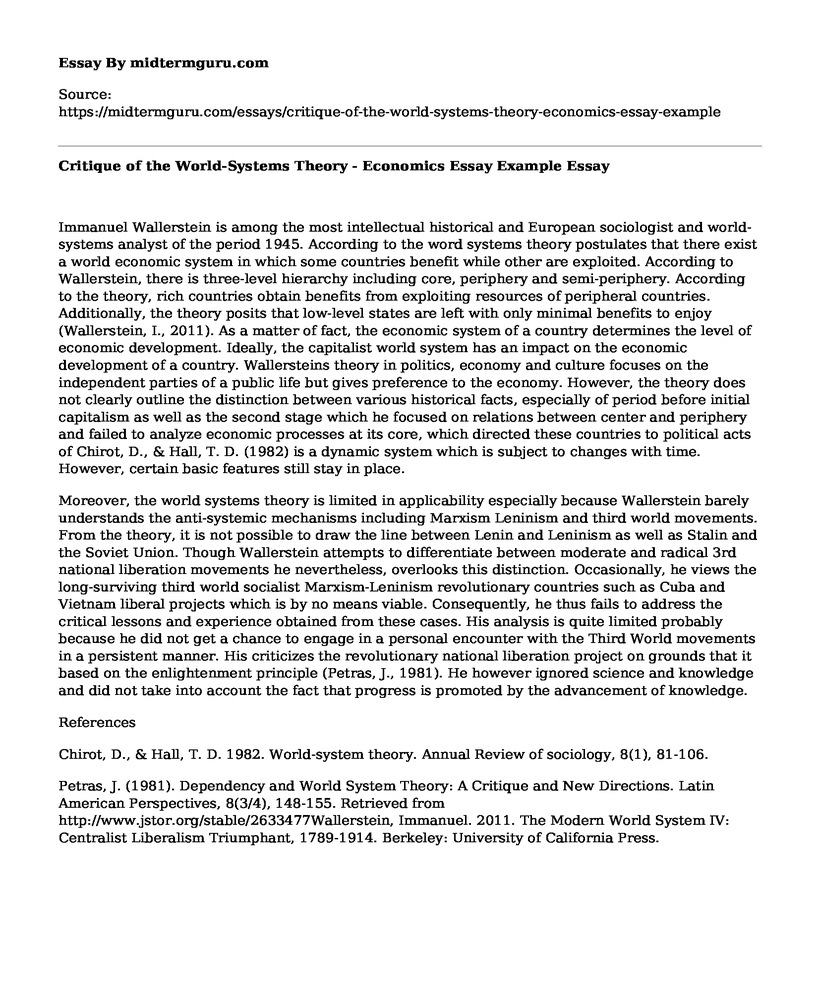Immanuel Wallerstein is among the most intellectual historical and European sociologist and world-systems analyst of the period 1945. According to the word systems theory postulates that there exist a world economic system in which some countries benefit while other are exploited. According to Wallerstein, there is three-level hierarchy including core, periphery and semi-periphery. According to the theory, rich countries obtain benefits from exploiting resources of peripheral countries. Additionally, the theory posits that low-level states are left with only minimal benefits to enjoy (Wallerstein, I., 2011). As a matter of fact, the economic system of a country determines the level of economic development. Ideally, the capitalist world system has an impact on the economic development of a country. Wallersteins theory in politics, economy and culture focuses on the independent parties of a public life but gives preference to the economy. However, the theory does not clearly outline the distinction between various historical facts, especially of period before initial capitalism as well as the second stage which he focused on relations between center and periphery and failed to analyze economic processes at its core, which directed these countries to political acts of Chirot, D., & Hall, T. D. (1982) is a dynamic system which is subject to changes with time. However, certain basic features still stay in place.
Moreover, the world systems theory is limited in applicability especially because Wallerstein barely understands the anti-systemic mechanisms including Marxism Leninism and third world movements. From the theory, it is not possible to draw the line between Lenin and Leninism as well as Stalin and the Soviet Union. Though Wallerstein attempts to differentiate between moderate and radical 3rd national liberation movements he nevertheless, overlooks this distinction. Occasionally, he views the long-surviving third world socialist Marxism-Leninism revolutionary countries such as Cuba and Vietnam liberal projects which is by no means viable. Consequently, he thus fails to address the critical lessons and experience obtained from these cases. His analysis is quite limited probably because he did not get a chance to engage in a personal encounter with the Third World movements in a persistent manner. His criticizes the revolutionary national liberation project on grounds that it based on the enlightenment principle (Petras, J., 1981). He however ignored science and knowledge and did not take into account the fact that progress is promoted by the advancement of knowledge.
References
Chirot, D., & Hall, T. D. 1982. World-system theory. Annual Review of sociology, 8(1), 81-106.
Petras, J. (1981). Dependency and World System Theory: A Critique and New Directions. Latin American Perspectives, 8(3/4), 148-155. Retrieved from http://www.jstor.org/stable/2633477Wallerstein, Immanuel. 2011. The Modern World System IV: Centralist Liberalism Triumphant, 1789-1914. Berkeley: University of California Press.
Cite this page
Critique of the World-Systems Theory - Economics Essay Example. (2021, Jun 10). Retrieved from https://midtermguru.com/essays/critique-of-the-world-systems-theory-economics-essay-example
If you are the original author of this essay and no longer wish to have it published on the midtermguru.com website, please click below to request its removal:
- Globalization, Civil Society and Global Poverty - Paper Example
- Supply and Demand in Tourism According to Goeldner and Ritchie
- The Great Disparity: How Middle Class Perfect Was Manufactured - Essay Sample
- Empowering Employees: Strategies for Leader Success - Essay Sample
- 5 Qualities for Successful Employees in Any Organization - Essay Sample
- Organizational Culture: Adhocracy Culture Promotes Creative Work Environment - Essay Sample
- Deskilling Debate: Will Technology Lead to Human Unemployment? - Essay Sample







